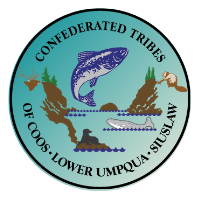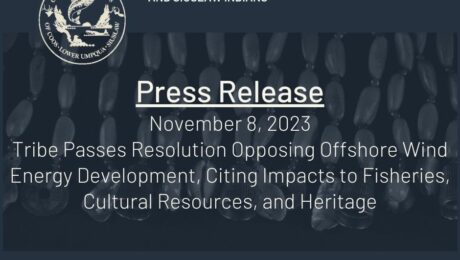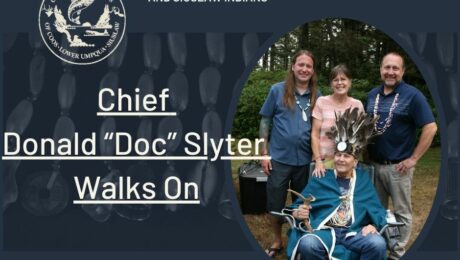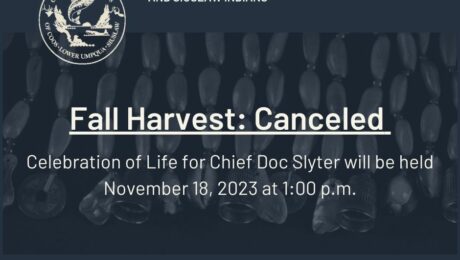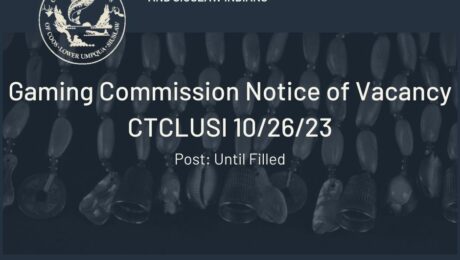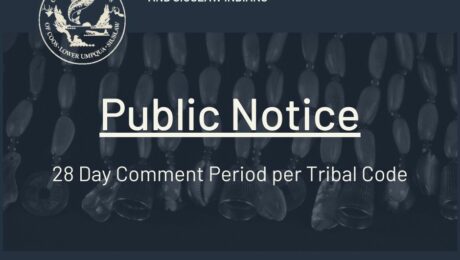TRIBE PASSES RESOLUTION OPPOSING OFFSHORE WIND ENERGY DEVELOPMENT, CITING IMPACTS TO FISHERIES, CULTURAL RESOURCES, AND HERITAGE
November 8, 2023, COOS BAY, OREGON – The Tribal Council of the Confederated Tribes of the Coos, Lower Umpqua and Siuslaw Indians (“Tribe”) unanimously passed a resolution expressing its opposition to offshore wind energy development off the Oregon Coast. The resolution corresponds with the deadline for comments on the federal Bureau of Ocean Energy Management (“BOEM”) two draft Wind Energy Areas (“WEAs”) for development of wind energy in areas near Florence and Brookings.
“After meetings with the Director of BOEM, it was apparent to the Tribe that its concerns regarding offshore wind development’s impacts to fisheries and cultural resources were not going to be addressed in a meaningful way,” said Tribal Council Chair Brad Kneaper. “The Tribe has not taken a position for offshore wind, but rather, we are at the table to learn about the impacts. We recognize that all energy development has impacts and BOEM has failed to provide assurance that wind energy development will do good and not harm the Tribe, its members, and the greater coastal community.”
In multiple communications with BOEM, including comments submitted this week on the WEAs, the Tribe has consistently raised concerns about wind energy development. These comments include a request that important, cultural viewsheds be excluded from the WEAs and that wind development avoid areas critical to resident and migratory species, including important areas for fishing.
“The Tribe also has consistently asked BOEM to exclude important fishing areas from wind energy development. Fishing is an important industry on the Coast that employs tribal members and supports tribal businesses. Fish, including salmon, are also an important cultural and subsistence resource to the Tribe. Any impact to fish from wind development is going to harm our local jobs and the Tribe,” said Chair Kneaper.
“Standards for green infrastructure should not be less than other energy development,” said Vice Chair Doug Barret. “Green infrastructure must not trump the federal government’s obligations to protect tribal resources. That is simply green colonialism. Because an energy is renewable is not justification enough to rush a process, to ignore or minimize adverse impacts to our community, environment, or cultural resources.”
“The Tribe remains open to working with the BOEM to resolve the issues raised in our comments,” said Chair Kneaper. “We plan to provide comments to BOEM on the WEAs, to provide testimony at the public hearings, and to coordinate with our local and state partners to address our concerns.”
“BOEM has demonstrated it is not serious about listening to the concerns of the Tribe or of our coastal communities,” said Chair Kneaper. “During a recent meeting, BOEM failed to follow through on a public testimony held in Coos Bay, and we repeatedly hear from our local government partners that BOEM has failed to connect or provide information about the impacts of wind energy development.”
The Tribe’s resolution echoes the concerns of other local governments, including Lane County and Coos County, which has expressed opposition to wind energy development, and resolutions of regional and national tribal organizations, including the National Congress of American Indians, which has called for a halt to the approval process until BOEM develops a process to consider Tribal impacts.
“This process is running roughshod over Tribal concerns, the concerns of commercial fishing, and local government. The Biden’s Administration of 30 gigawatts of wind energy by 2030, while an admirable goal, should not provide a blank check for BOEM to disregard the coastal resources that we hold dear,” said Chair Kneaper.
“The Tribe has called the Coast our home since Time Immemorial,” said Vice Chair Barrett. “The unique landscape, places of religious significance, viewsheds and traditional resources of our Ocean, bays, upland dunes, forests, archaeological features, cultural resources, and first foods connect us to our tribal ancestors. Our homelands and Ocean have been the foundation of our way of life since time immemorial and remains a cornerstone of our Tribe to this day. As a confederation of coastal tribes deeply dependent on the Ocean and its rich resources, we assert a direct interest in the viewshed extending from our shores, encompassing a distance of at least twelve nautical miles beyond the continental shelf. We believe it is our inherent right to have the ability to see across our viewsheds, as this direct connection is integral to our cultural practices and traditional way of life. This connection empowers us to protect and conserve our cultural resources for the prosperity of our future generations. Our religious beliefs, traditional practices, fishing, first foods and relations are interconnected and influenced by all that is encompassed in the broader Ocean.”
In its October 31, 2023 comments to BOEM, the Tribe called upon BOEM to halt its process to allow for consideration of impacts of wind energy, including consideration of a congressionally mandated National Academy of Science study on wind energy impacts to fisheries on the West Coast.
The Resolution passed by the Tribal Council makes it clear that the Tribe will take all necessary action to oppose BOEM’s actions or otherwise ensure that invaluable natural and cultural resources are protected.
A copy of the Resolution and October 31, 2023 comments to BOEM are included with this press release.
- Published in Public Notices, Tribal Event, Tribal News
Chief Donald “Doc” Slyter Walks On
A Celebration of Life to honor our Tribal Chief Donald (Doc) Slyter, will be held On November 18th at 1:00pm at the Community Center & Tribal Hall at 338 Wallace Ave Coos Bay, Oregon
All are welcome to attend.
After a long battle, Chief Donald “Doc” Slyter has left this world to rejoin the Creator. He passed at home surrounded by his family.
His lifelong perseverance, up until the very end, would certainly make our ancestral Warriors proud. Never one to back down or admit defeat, he fought for what he believed was right.
He spent nearly his entire life living on the Southern Oregon Coast. He was married to his wife Debbie for 50 years, yet another testimony of his commitment and determination.
At the time of his passing, Donald Slyter was the acting Chief for The Confederated Tribes of Coos, Lower Umpqua and Siuslaw. His lifelong involvement with the Confederated Tribes gave him the opportunity to witness their return to Recognized status in 1984, followed by 39 years of growth and success. Never content, Chief Slyter felt an obligation not only to those Tribal Members today, but also those of future generations.
His presence will be missed by many. Without doubt, his Spirit will watch over all friends and family. Additional information on plans to celebrate his life will be shared soon.
Sincerely,
His proud sons- Tyler and Scott Slyter
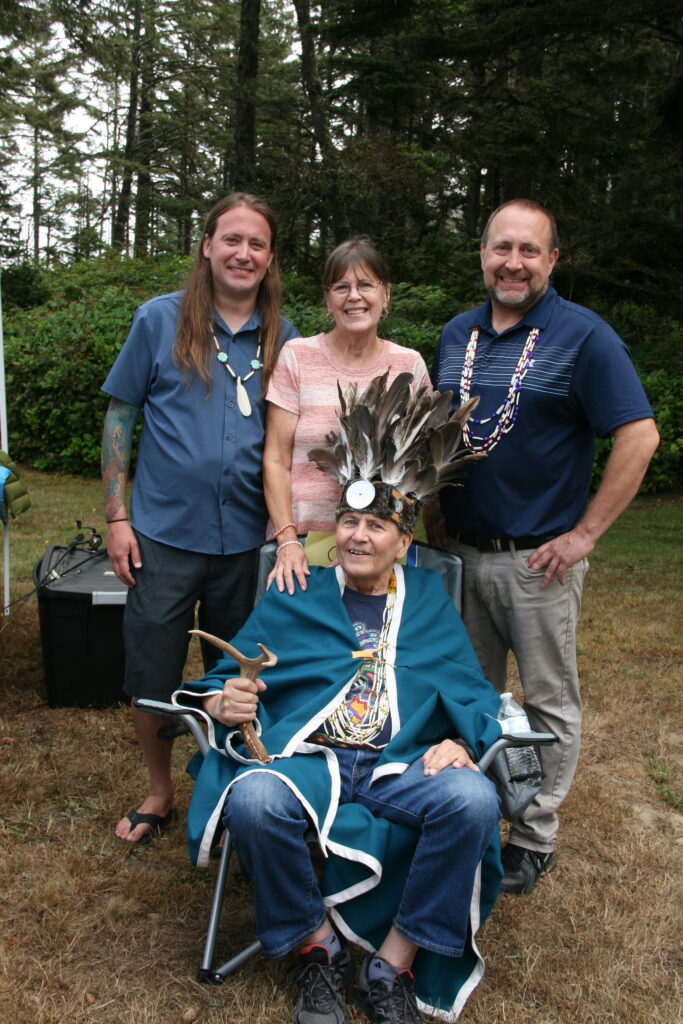
It is with a heavy heart and expressed sadness to learn of the passing of our beloved Chief Doc Slyter. Chief was a great man, a mentor and a friend to me and many others. I have known him for nearly 20 years and since I came to work for the Tribe back in 2004, he always had a word of wisdom for me. I have enjoyed working with him, and will miss the talks and interaction as he was very instrumental in our decision-making process. We did not always agree, but we always treated each other with respect and came away with a smile. My heart goes out to the family and the Tribal membership. It is never goodbye Chief, but we will see you again. I will provide more information as it becomes available. Please feel free to reach out to Tribal Council during this difficult time for our Tribe.
Brad Kneaper
Tribal Chair
- Published in Public Notices, Tribal Event, Tribal News
Fall Harvest Celebration 2023
To All Tribal Members and Families;
Due to the recent loss of our Tribal Chief, The Tribal Council sponsored Fall Harvest Event scheduled for November 18th has been Canceled.
For those who wish to attend :
A Celebration of Life to honor our Tribal Chief Donald (Doc) Slyter, will be held On November 18th at 1:00pm at the Community Center & Tribal Hall at 338 Wallace Ave Coos Bay, Oregon
All are welcome to attend.
- Published in Public Notices, Tribal Event, Tribal News
Three Rivers Casino Resort Holiday Toy Drive
Media Contact
Rich Colton – 541-999-7942
Three Rivers Casino Resort Announces Holiday Toy Drive to Support Local Families
FLORENCE, Ore. – As the holiday season approaches, Three Rivers Casino is reaching out to its community
to make a difference in the lives of children in need. The Casino’s 19th annual Toy & Food Drive will run
from Nov. 1 to Dec. 6, inviting residents to join in the spirit of giving as the needs continue to grow.
Members of the community are encouraged to contribute by bringing in a new, unwrapped toy valued at $5 or more or donating three cans of non-perishable food items. Donors will receive $5 in free play at Three Rivers Casino.
“At Three Rivers Casino, we are deeply rooted in our community, and we understand the importance of giving back, especially during the holiday season,” said Marguerite Morgan, Promotions Coordinator at Three Rivers. “We live here, we work here, and we want to ensure that children in our area experience the joy and magic of the holidays.”
Florence resident Liberty Kommer knows firsthand the importance of generosity. Having faced a childhood without the opportunity to receive a single toy or experience the warmth of the holiday season, Kommer has made it her personal mission to ensure that Florence-area children don’t go through the same experience.
Since 2020, Kommer has saved up $1,000 annually to purchase toys for local children, including last year’s
generous donation of a truckload of bicycles and helmets to the Toy & Food Drive. “These children need to understand how precious they are, how their lives are so important. We need to show those children we care about their wellbeing. So please, donate Christmas toys and gifts to the children of our community,” said Kommer.
In nearly two decades, the casino has collected thousands of toys for the local community. As the drive
concludes in December, all donated toys will be handed over to the local police station, ensuring that they find their way into the hands of children in Florence, brightening their holiday season.
“Drop a toy off, make a child’s life exciting and fun. It’ll bring joy to everybody here in our community,” said Morgan. Join Three Rivers Casino in making a positive impact this holiday season by participating in the Toy & Food Drive.
For more information, visit www.threeriverscasino.com
- Published in Public Notices, Tribal Event, Tribal News
Gaming Commission Notice of Vacancy
CTCLUSI 10/26/23
Post: Until Filled
The Confederated Tribes of Coos, Lower Umpqua and Siuslaw Indians’ Gaming Commission is established pursuant to CLUSITC 5-2-7. The purpose of the Gaming Commission is to regulate Class II and Class III gaming on the Confederated Tribes’ Indian Land. The Commission consists of five (5) members appointed by a majority vote of the Tribal Council.
The Gaming Commission has a vacancy in Position #3 and is currently seeking interested parties. The remaining term of this position is until 02/28/2025. Interested parties shall file a statement with the Commission reflecting their interest in serving as a Commission member.
Qualifications for the Posted Vacancy:
Commissioners must meet the following minimum eligibility requirements (CLUSITC 5-2-7(d):
- Must be at least twenty-one (21) years of age;
- Must successfully complete a background investigation, as set forth in CLUSITC 5-2-15;
- No member of Tribal Council may serve as a Commissioner; and
- No employee of a Gaming Operation may serve as a Commissioner.
Each applicant for Commission membership shall be subject to a background investigation (CLUSITC 5-2-13) and drug testing (CLUSITC 5-2-21).
Interested parties may file a statement of interest with the Commission reflecting their interest in serving as a Commission member to Rusty Bossley, Executive Director of the Gaming Commission, at the following address:
5647 Hwy 126 Suite 100
Florence, OR 97439
You may also fax your statement to 541-997-7293, or email at rbossley@ctclusi.org.
**************************************************************************************
This notice of vacancy shall be posted at all Tribal offices.
- Published in Public Notices, Tribal Event, Tribal News
Tribal Police to Participate in National Prescription Drug Take Back Day
10/26 – Thurs – Eugene
10/27 – Fri – Florence
10/28 – Sat – Coos Bay
The Tribal Police Department will once again be participating in the National Prescription Drug Take Back Day held on Saturday October 28th from 10am – 2pm at the governmental offices at 1245 Fulton Avenue in Coos Bay. This event is sponsored by the Drug Enforcement Administration (DEA) and it provides the supplies to be able to collect unused or expired prescription medications to ensure that they are safely disposed of without falling into the wrong hands or unnecessarily polluting.
TPD personnel will be outside (parking lot) so that participants can just pull up and drop off their items.
After the event (on Saturday), from 2pm – 3pm, Tribal Police Officers will be available to travel within 20 miles of the governmental office to pick up any unused or expired medications from Tribal families or Tribal Elders. If you know of someone who would like to participate, but is unable to make it to any of the events, please have them contact me for scheduling at our office: 541-997-6011.
There will be no identifying information collected, and the program is anonymous. We encourage participants to remove any identifying labels from bottles prior to submission. We will be able to accept vape pens without internal batteries, controlled, non-controlled and over the counter medications with a few exceptions; Intra-venous solutions, injectables, syringes, chemotherapy medications, or medical waste WILL NOT be accepted.
If you have any questions about the program, please let me know. Our goal is to keep medications from being lost, stolen, or misused. If you would like to view information about the program from the DEA, please visit: https://takebackday.dea.gov/ . If you know someone who lives outside of the area, they can also search by zip code to find an event nearby.
In addition to the National Drug Take Back Day on Saturday, Tribal Police Officers will be at the Eugene outreach office on Thursday, October 26th from 11am – 2pm to accept any medications and also at the Florence outreach office on Friday, October 27th from 11am – 2pm.
Since we began partnering with the DEA in the NDTBD program in 2018, the Tribal Police Department has helped to keep over 280 pounds of medications from being misused or otherwise polluting our landfills and waterways. Anyone is welcome to participate, so feel free to share the information with your friends and family.

- Published in Public Notices, Tribal Event, Tribal News
Proposed Code Amendments: Chapter 4-3 Child Protection Team; Chapter 7-9 Investment Committee; Chapter 7-12 Tribal Health Board
The following proposed Codes amendments was passed for First Reading by Tribal Council on August 30, 2023
TITLE: 4 DOMESTIC
Chapter 4-3 Child Protection Team
The Tribal Council has determined the due to unqualified or untrained members to act in the capacity to make recommended decision related to children and families create a possible liability to the Tribe. Tribal Council voted to rescind Chapter 4-3 Child Protection Team in its entirety at this time.
TITLE: 7 ENROLLMENT, COMMITTEES, ELECTIONS AND REFERENDUMS
Chapter 7-9 Investment Committee
The Tribal Council has retained professional investment advisor services and has determined that the Investment Committee is no longer needed to provide advice to the Tribal Council regarding investment decisions and voted to rescind the Chapter 7-8 in its entirety at this time.
TITLE: 7 ENROLLMENT, COMMITTEES, ELECTIONS AND REFERENDUMS
Chapter 7-12 Tribal Health Board
The Tribal Council has determined the Tribal Health Committee has been defunct, not otherwise utilized an its need will be reexamined once the Tribal Health Center has opened. Tribal Council voted to rescind Chapter 7-12 in its entirety at this time.
Tribal Council hereby approves the amendments to the three Codes for First Reading and posting for a twenty-eight (28) day period.
DATE OF THE TRIBAL COUNCIL MEETING AT WHICH THE PROPOSED CODE IS EXPECTED TO BE CONSIDERED FOR FINAL PASSAGE:
November 12, 2023
- Published in Public Notices, Tribal Event, Tribal News
BUREAU OF OCEAN ENERGY MANAGEMENT (BOEM)INFORMATION WORKSHOP
The Department of Culture and Natural Resources (CNR) of Confederated Tribes of Coos Lower Umpqua and Siuslaw hosted an educational workshop 9/26/23 to provide information regarding potential issues and impacts of the decision making by BOEM. BOEM is a U.S. Government Agency that is proposing the development of renewable energy from offshore wind. the CNR department provided information on how you can participate in person at the upcoming public comment opportunities, as well as offering your own public comments in writing for submission. Contact us for more information.
Below is a template letter that Tribal Membership can use to summit public comments. To submit comments please visit the following websites…
https://www.boem.gov/renewable-energy/state-activities/Oregon
https://www.regulations.gov/document/BOEM-2023-0033-0001
Recording of public meeting held at the CTCLUSI Community Center on 9/26/23 coming soon.
- Published in Public Notices, Tribal Event, Tribal News
CTCLUSI and ODFW Agreement Signing Event
Tribal Council held an event on Wednesday, September 20, 2023 at 2:00 p.m. PST for the Historic Cooperative Management Agreement Signing between the Tribe and ODFW. This agreement Affirms Rights of Members to Hunt, Fish, Trap and Gather Under Tribal Licenses.
- Published in Public Notices, Tribal Event, Tribal News
August Heat Wave
KEY POINTS
Confidence is very high ( 90% chance ) a heat wave will impact locations west of the Cascades next week. The heat wave is anticipated to last around 5 to 6 days.
The heat will pose a high threat of heat related illness for those without effective cooling or adequate hydration during red days. Lightning threat increases towards next week in northern California.
FOR MORE INFORMATION
A strong and somewhat unusual heat wave, 1 in 2 year event , will move over the region between Sunday and Thursday(8/17) next week. The threat of heat related illness is highest between Tuesday and Wednesday when there is about a 15% – 25% chance of high temperatures exceeding 110 degrees in Medford, Oregon. In addition, this will be the
3rd and 4th day of the heat event. The risk of heat related illness is higher towards the middle and end of the event. In addition, there is a 15% chance of thunderstorms within 25 miles of any location in northern California next week. For the latest forecast updates, visit weather.gov/Medford.



- Published in Public Notices, Tribal Event, Tribal News
